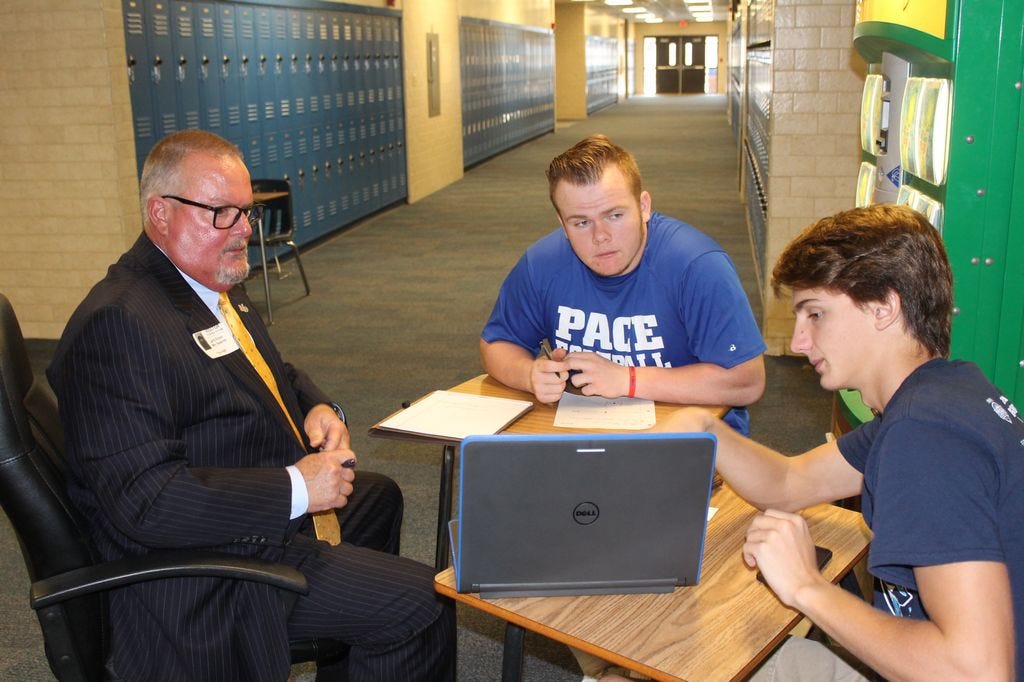
CNBC’s reality television show Shark Tank invites entrepreneurs of all types to pitch their businesses to a panel of four or five investors and ask for money in exchange for a stake in their companies. This spring, a class of Pace High School students will have the same opportunity as part of the Young Entrepreneurs Academy, known as YEA!. However, the program is in its first year and the group needs help from the business community in the way of mentors as the class progresses, and investors when it comes time to climb in the shark tank.
According to Charlin Knight, Director of Workforce Education for Santa RosaSchool District, students are taught to write business plans, prepare and pitch their ideas to investors, obtain financial backing, register their businesses and social organizations, develop marketing plans and materials, prepare for trade shows, and sell their products and services. “It’s really exciting,” she said, students becoming CEO’s this year. According to Knight, these aren’t simulations and investors will be able to put real money down to make the businesses these students create a reality.
Every student is working to see his or her business to fruition, but some are working in groups while others are flying solo. Larry Strain is the Vice President of United Bank and is a mentor for a group in the academy. He said he’s already familiar with the program and has assisted with YEA! in Pensacola. One of the businesses in Strain’s group is related to spear fishing. He said a challenge his team has faced is “writing a business plan. It’s not something most (of the students) have done.” He also noted, “It’s real money involved. From an investor’s (perspective), they’re less interested in what’s cool than how to make money. (The business needs to be) less transactional and more scalable.”
Celene Sessions is the classroom teacher for the academy. She said, “It’s obvious that YEA! gives young people a chance to participate in a real-world opportunity where they learn speaking and business skills that will prove invaluable in their success in life.”
The YEA! program differs from traditional classes in several ways Sessions said. “Certainly they have had opportunities that do not typically arise in a traditional classroom environment. They have had numerous guest speakers covering topics such as marketing, manufacturing and product development, accounting, law, insurance and more. We have already taken one field trip, and have five more field trips in our future. They have experienced more real-world in four short months than most students receive in four years. They have met community members who will be resources now and in the future.”
Sessions said students have the choice of creating a business or a nonprofit organization. The businesses split between services and products. Collin Carpenter is a student in the program who is working on a product to make hunters a better shot. Carpenter said, “Being in this academy is different. It means something. This applies to the rest of our lives.” He said before the academy he assumed he could easily make an item and sell it. He said now “I have to think of licensing, taxes. An idea has 10,000 steps.”
Drew Williamson is already working in landscaping outside of school but wants to expand and focus on commercial landscaping. The academy, he said, “gave me the motivation to get started.” He said some of the challenges have been getting his name out, building relationships with customers, and learning the legal side such as taxes, liability insurance, and workman’s comp. Williamson said he’s just met his mentor who owns a landscaping business and said he’s supportive. “I’m going to ask about advertising and how to place bids.”
Kayla Perry is one of four girls in YEA!. She said there were several girls in the academy at first but many dropped out. Perry’s business involves dog grooming and she’s dedicating it to her mother. The academy “is a lot different than I expected it to be, like economics or marketing.” Perry said advertising has been a challenge. “I’m not a persuasive person…I was scared at first but now I’m excited.”
As the class gets off the ground and anticipates their pitches in the spring, some students still need mentors. Sessions said, “I do believe the academy can take root at Pace as long as the community continues to support us. This program’s success is fully dependent on community support, from guest speakers, to mentors, to investors, to field trip hosts. Truly, this is an ‘it takes a village’ type of program, and I believe the community will benefit from the school-community partnership. The level of commitment needed from the business community is the only thing that could prevent this program from going district-wide as it does take a large number of willing business participants.”
This article originally appeared on Santa Rosa Press Gazette: Pace students aim to start real businesses
